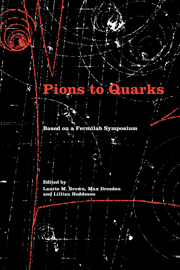Book contents
- Frontmatter
- Contents
- List of contributors
- Foreword by Leon M. Lederman
- Editors' acknowledgments
- Photographs of the symposium
- List of abbreviations
- List of notation
- I Introduction
- II Particle discoveries in cosmic rays
- III High-energy nuclear physics
- IV The new laboratory
- V The strange particles
- VI Weak interactions
- VII Weak interactions and parity nonconservation
- VIII The particle physics community
- 34 The postwar political economy of high-energy physics
- 35 The history of CERN during the early 1950s
- 36 Arguments pro and contra the European laboratory in the participating countries
- 37 Physics and the excellences of the life it brings
- 38 Social aspects of Japanese particle physics in the 1950s
- IX Theories of hadrons
- X Personal overviews
- Name index
- Subject index
37 - Physics and the excellences of the life it brings
Published online by Cambridge University Press: 07 May 2010
- Frontmatter
- Contents
- List of contributors
- Foreword by Leon M. Lederman
- Editors' acknowledgments
- Photographs of the symposium
- List of abbreviations
- List of notation
- I Introduction
- II Particle discoveries in cosmic rays
- III High-energy nuclear physics
- IV The new laboratory
- V The strange particles
- VI Weak interactions
- VII Weak interactions and parity nonconservation
- VIII The particle physics community
- 34 The postwar political economy of high-energy physics
- 35 The history of CERN during the early 1950s
- 36 Arguments pro and contra the European laboratory in the participating countries
- 37 Physics and the excellences of the life it brings
- 38 Social aspects of Japanese particle physics in the 1950s
- IX Theories of hadrons
- X Personal overviews
- Name index
- Subject index
Summary
The title of this essay is taken from Robert Oppenheimer. He had three types of excellence in mind: first, for the theoretician, the excellence of new ideas while he attempts to read Allah's design; for the experimenter, the excellence of new discoveries, the sheer pleasure of the search of carrying an experimental technique to its limits and beyond; and, finally, of the desire to spite the theorist. Oppenheimer had these forms of excellence in mind, but also much more: He emphasized the opportunity physics affords to come to know internationally a class of great human beings whom one respects not only for their intellectual eminence but also for their personal human qualities – a reflection of their greatness in physics. In addition, he had in mind the opportunities that physics uniquely affords for involvement with humankind – in the parlance of today, in engaging in problems of development and of enhancing the human ideal.
I wish to speak here on some aspects of Oppenheimer's thoughts from a personal point of view. I shall illustrate these by recalling my induction into research on the renormalization of meson theories and the excellent men I was privileged to meet while pursuing this research. I also wish to speak on excellence through world development. In particular, I want to speak about the International Centre for Theoretical Physics, whose creation, under the auspices of the United Nations, I was privileged to suggest in September 1960. The Centre came into being only in October 1964 – beyond the cutoff date of this symposium's coverage.
- Type
- Chapter
- Information
- Pions to QuarksParticle Physics in the 1950s, pp. 525 - 535Publisher: Cambridge University PressPrint publication year: 1989



